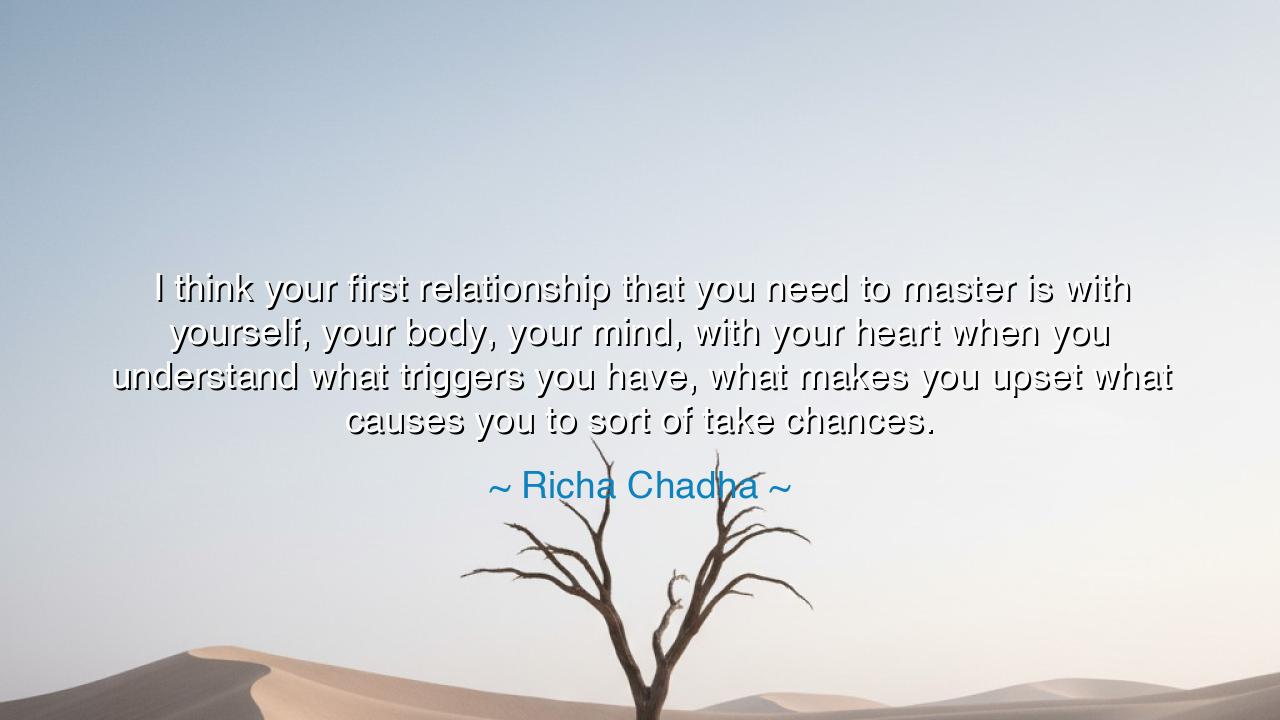
I think your first relationship that you need to master is with
I think your first relationship that you need to master is with yourself, your body, your mind, with your heart when you understand what triggers you have, what makes you upset what causes you to sort of take chances.






The wise Richa Chadha speaks of the foundation of all harmony when she declares: “I think your first relationship that you need to master is with yourself, your body, your mind, with your heart—when you understand what triggers you have, what makes you upset, what causes you to sort of take chances.” In these words lies a timeless truth: that the journey of life begins not with conquering the outer world, but with understanding the inner realm. Without self-knowledge, all other bonds remain fragile and uncertain.
To master the relationship with yourself is to become both seeker and guide of your own soul. The body is the vessel through which life flows; the mind, the compass that perceives and reasons; the heart, the seat of passion and desire. When these three are in discord, one is pulled in many directions, like a ship lost in stormy seas. But when they are brought into harmony through awareness and care, the individual gains strength and clarity, ready to face the trials of the world.
Richa Chadha speaks of knowing one’s triggers—those hidden forces that stir anger, fear, or reckless desire. Many wander through life blind to these inner fires, reacting without understanding and thus causing suffering to themselves and others. By studying what upsets us, we gain the power to respond rather than react, to choose our path with wisdom instead of being dragged by impulse. This is the first step toward true freedom.
When this inner mastery is achieved, the heart finds courage to take chances without being ruled by chaos or fear. Relationships with others—whether of love, family, or friendship—become deeper and more authentic, for they are no longer born from insecurity or confusion. Instead, they arise from a place of strength and self-awareness, like a tree with roots deep in fertile soil, unshaken by passing storms.
Thus, let this teaching be passed to future generations: before seeking to understand the world, seek to understand yourself. Tend to your body, sharpen your mind, and listen to your heart, for these are the pillars upon which all relationships stand. When you have mastered the inner realm, the outer realm will follow, and you will walk through life with purpose, balance, and unshakable peace.






TMPham Tri Man
Richa Chadha’s words really resonate with me, especially the idea that understanding your triggers is key to personal growth. It seems like we often make decisions or react impulsively without understanding the underlying reasons. But how do we get better at being aware of those triggers in real-time, especially when emotions are running high? Is self-awareness the key to avoiding impulsive decisions, or is it more about learning how to manage those moments effectively?
MTMinh Trang
The idea of mastering the relationship with ourselves before anything else really hits home. It’s easy to get caught up in external relationships or achievements, but understanding what makes us tick is so crucial. I wonder, though, is it possible to ever fully master this relationship, or is it a lifelong process? And how do we handle the times when we uncover things about ourselves that we don’t like or that are hard to change?
GDGold D.dragon
Richa Chadha’s quote touches on something that I think we all struggle with—being aware of how we react to the world around us. When you know what triggers you, you can manage your emotions better and take more thoughtful risks. But what happens when we’re unaware of our triggers or don’t want to face them? How do we push ourselves to dig deeper into our minds and hearts when it feels uncomfortable?
TNThanh Nha
I agree with Richa Chadha that understanding ourselves is the foundation of everything else. It’s amazing how often we overlook how our emotions and reactions are shaped by past experiences or hidden triggers. But the real question is, how do we start identifying those triggers? Is it through mindfulness, therapy, or something else? And once we understand them, how do we use that awareness to make better choices?
NBHAN LE NGOC BAO
Richa Chadha’s perspective on mastering the relationship with oneself is so profound. It makes me think about how much of our reactions and decisions are influenced by what we haven’t fully understood about ourselves. How often do we act without realizing what truly triggers us? Understanding ourselves on a deeper level seems like the first step toward growth. How do we even begin to tackle something as complex as knowing ourselves completely?